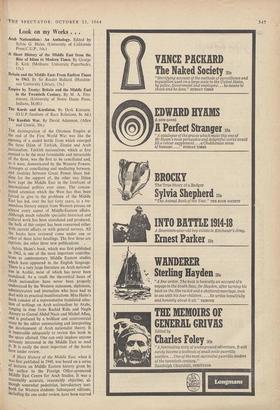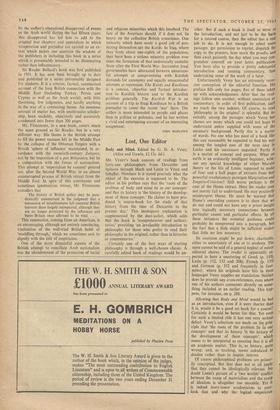Look on my Works . . .
A Short History of the Middle East from the Rise of Islam to Modern Times. By George E. Kirk. (Methuen: University Paperbacks, 15s.) Empire by Treaty: Britain and the Middle East in the Twentieth Century. By M. A. Fitz- simons. (University of Notre Dame Press, Indiana, $6.00.) The Kurds and Kurdistan. By Derk Kinnane. (0.U.P./Institute of Race Relations, 8s. 6d.) Ti disintegration of the Ottoman Empire at the end of the First World War was like the Opening of a sealed bottle from which emerged the three Djinn of Turkish, Zionist and Arab nationalism. Turkish nationalism, which at first seemed to be the most formidable and intractable of the three, was the first to be conciliated and, as it were, domesticated by the Western Powers. Attempts at conciliating and mediating between, and rivalries between Great Power blocs bid- ding for the support of, the other two Djinn have kept the Middle East in the forefront of international politics ever since. The concen- trated attention which the West has thus been forced to give to the problems of the Middle East has led, over the last forty years, to a tre- mendous literary output from Western presses on almost every aspect of Middle-Eastern affairs. Although much valuable specialist historical and cultural work has been stimulated and produced, the bulk of this output has been concerned either With current affairs or with general surveys. All the books here reviewed come under one or Other of these latter headings. The first three are reprints, the other three new publications. .
Sylvia Haim's book, which was first published in 1962, is one of the most important contribu- tions to contemporary Middle Eastern studies Which have appeared in the English language. There is a very large literature on Arab national- ism in Arabic, most of which has never been translated. As a result the theoretical bases of Arab nationalism have never been properly understood by the Western statesmen, diplomats, administrators and journalists who have had to deal with its practical manifestations. Miss Haim's book consists of a representative translated selec- tion of writings on Arab nationalism by Arabs, ranging in time from Rashid Rida and Negib Azoury to Gamal Abdul Nasir and Michel Aflaq, and is prefaced by a brilliant and controversial essay by the editor summarising and interpreting the development of Arab nationalist theory. It iS impossible adequately to review this book in the space allotted. One can only implore anyone seriously interested in the Middle East to read it. It is easily the most important of the books here under review.
A Short History of the Middle East, when it Was first published in 1948, was based on a series of lectures on Middle Eastern history given by the author to the Foreign Office-sponsored Middle East Centre for Arab Studies. It was a reasonably accurate, reasonably objective, al- though somewhat pedestrian, ntroductory text-
„
unnk for Western students. Subsequent editions, including the one under review, have been marred
by the author's obsessional disapproval of events in the Arab world during the last fifteen years; this disapproval has led him to add to the original text chapters and appendices in which vituperation and prejudice are carried to an ex- tent which makes one question the wisdom of the publishers in including this book in a series which is presumably intended to be illuminating rather than inflammatory.
Sir Reader Bullard's book was first published in 1951. It has now been brought up to date and published in a series presumably designed for students. It is a concise, factual, summarised account of the long British connection with the Middle East (including Turkey, Persia and Cyprus as well as the Arab world), with little theorising, few judgments, and hardly anything in the way of a connecting theme. An immense amount of matter has, with unobtrusive scholar- ship, been readably, objectively and accurately condensed into fewer than 200 pages.
Mr. Fitzsimons, in a new book, covers much the same ground as Sir Reader, but in a very different way. His theme is the British attempt to fill the power vacuum left in the Middle East by the collapse of the Ottoman Empire with a British 'sphere of influence' maintained, in ac- cordance with the twentieth-century Zeitgeist, not by the imposition of a pax Britatznica, but by a composition with the forces of nationalism. This attempt at 'imperialism by consent' petered out, after the Second World War, in an almost uninterrupted process of British retreat from the Middle East. In spite of this continuous and sometimes ignominious retreat, Mr. Fitzsimons considers that
The history of British policy may be para- doxically summarised in the judgment that a succession of misadventures left essential British interests there largely unimpaired, although they are no longer protected by the influences and bases Britain once affirmed to be vital. . . . This summation, coming from an American, is an encouraging, although not entirely convincing, vindication of the well-tried British habit of 'muddling through,' which we sometimes seek to dignify with the title of empiricism.
One of the more distasteful aspects of the British attempt to conciliate Arab nationalism was the abandonment of the protection of racial
and religious minorities which this involved. The fate of the Assyrians should, if it does not, lie heavy on the collective British conscience. One minority which have made a good job of pro- tecting themselves are the Kurds. In Iraq, where they form about one-eighth of the population, they have been a serious Minority problem ever since the formation of that endemically unstable State after the First World War. Successive Iraqi governmehts have alternated between unsuccess- ful attempts at compromising with Kurdish demands for autonomy and equally unsuccessful attempts at repression. The Kurds and Kurdistan is a concise, objective and factual introduc- tion to Kurdish history and to the Kurdish problem generally. The Kurdish War is an account of a trip to Iraqi Kurdistan by a British journalist to cover the recent 'war' there. The author is more interested in people and places than in politics or polemics, and he has written a vivid and entertaining account of an interesting assignment.
JOHN MARLOWE



































 Previous page
Previous page